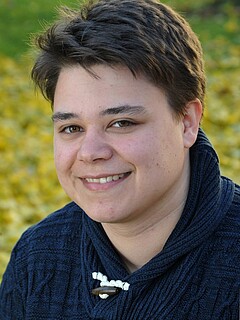PhD students 1st cohort

Dr. Alexander Stöger
Curriculum Vitae
Dr. Alexander Stöger (born 1990) studied a Bachelor with a major in German studies and philosophy at Friedrich Schiller University Jena between 2009 and 2012. From 2012 to 2014 he completed his Master of German Classics in the European Context, again at FSU Jena. During his studies he was a student assistant at the Institute for German Language Studies, the Institute for German Literature Studies and the Institute for Philosophy. He was also involved in the preparation of exhibitions (‘Relief and map: terrain display since 1800’, Ernst-Haeckel-Haus, Jena; and ‘Charlotte von Schiller’, Goethe-und-Schiller-Archiv, Weimar) and worked as an assistant from FSU Jena on the editorial team of ‘Globenfreund’. He was a PhD student at the ‘Romanticism as a Model’ research training group from October 2015 through September 2018 and was awarded his degree cum laude in May 2019.
PhD project (finished)
Galvanistic Experiments in Discourse: Methods between Romantic Ideas and Professionalization Efforts
This PhD project deals with the transformation of natural philosophy (Naturphilosophie) into the professionalised natural sciences (Naturwissenschaften) around 1800 and the question of how much this transition was affected by the ideas of Early Romanticism (Frühromantik) in Germany. The public discourse about standards and concepts of scientific methods in journals specialised on naturalistic research of the period will be analysed and compared to the development of natural sciences in Great Britain. The thesis will consider Galvanism, which was an interdisciplinary phenomenon in the scientific community as well as in the public domain around 1800 and can thus be considered an example of the tense relationship between natural philosophy and empirically oriented research efforts.
Publications
Aufsätze
Humboldtstudien, in: Ariane Ludwig/Silke Henke (Hg.): „Damit doch jemand im Hause die Feder führt“. Charlotte von Schiller. Eine Biographie in Büchern, ein Leben in Lektüren, Weimar 2015, S. 81-89 (= Schätze aus dem Goethe- und Schiller-Archiv, Bd. 3).
Experiment und Öffentlichkeit. Zur Darstellung in den frühen Galvanismusschriften Alexander von Humboldts und Johann Wilhelm Ritters, in: Im Umfeld der Weimarer Klassiker. 100. Tagung der Humboldt-Gesellschaft, hrsg. von der Humboldt-Gesellschaft für Wissenschaft, Kunst und Bildung e.V., Roßdorf 2015, S. 129-144 (= Abhandlungen der Humboldt-Gesellschaft Bd. 34).
Experiment und Wissensvermittlung. Alexander von Humboldts Darstellungsmethoden in seinen Versuchen über die gereizte Muskel- und Nervenfaser, in: Ottmar Ette/Eberhard Knobloch (Hg.): HiN – Humboldt im Netz. Internationale Zeitschrift für Humboldt-Studien (17/33) 2016, S. 72-82.
(Zs. mit Johannes Hellrich/Udo Hahn) Wenn der Funke überspringt – Word Embeddings im Dienst der Wissenschaftsgeschichte, in: DHd 2018, Kritik der digitalen Vernunft. Köln, Germany, Februar 26 – March 2, 2018. pp. 331-335.
Kleinere Beiträge
Art. „Kartenprojektionen. Zur mathematischen Interpretation der Dreidimensionalität“; Art. „Militärkartographie. Instruktionen zur Erfassung des Geländes“; Art. „Relief und Karte. Zur Darstellungspraxis der Erdoberfläche“;
Art. „Reißzeug. Die Erstellung kartographischer Zeichnungen um 1800“; Art. „Das Barometer als Höhenmesser. Saussure, Humboldt und Goethe“; Art. „Das Basrelief. Eine alternative Geländedarstellung durch Carl Ritter“;
Art. „Der Schlosspark der „Wahlverwandtschaften“. Kartographie und Literatur“, in: Relief und Karte. Geländedarstellungen seit 1800. Jena 2013.
Wo Barbarossas wüste Trümmer stehen, in: FAZ.NET, 20.08.2017
Presentations
Experiment und Öffentlichkeit. Alexander von Humboldts und Johann Wilhelm Ritters Galvanismus-Schriften [Im Umfeld der Weimarer Klassik, 100. Tagung der Humboldt-Gesellschaft, Weimar, 04. Oktober 2014]
Galvanistische Darstellungsexperimente im Diskurs. Zwischen Romantischen Ideen und Professionalisierungsbestrebungen [Universität Kassel, Mai 2016]
A model of Discourse. Induction and deduction as methods around 1800 [Ernst-Haeckel-Haus Jena, Juni 2016]
Der Funke springt über. Professionalisierung und Schauexperimente im Wissenschaftsdiskurs um 1800 [Wissenstransfers zwischen akademischer Forschung und öffentlichem Raum, Interdisziplinäres Kolloquium:
„Wissenschaftskulturen im Vergleich (5)“, Universität Koblenz-Landau, 04.-05. November 2016]
Galvanic Spectacles. German and British epistemic virtues around 1800. [Postgraduate Conference der British Society of the History of Science, Manchester, 4.-5. April 2018]